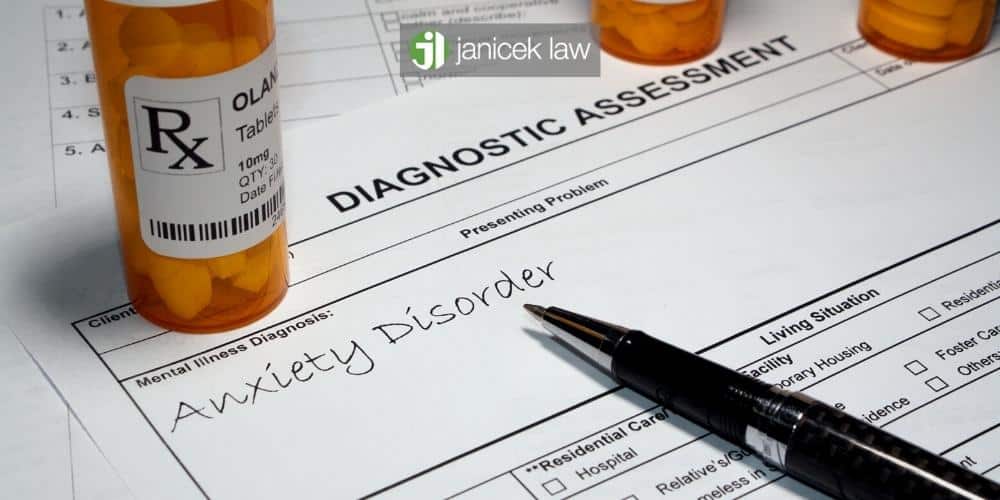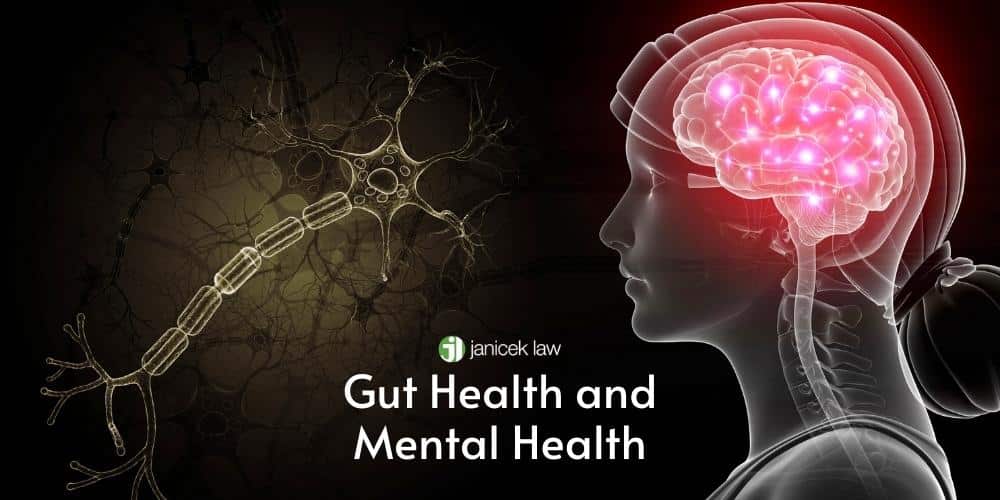Most people have gone into a performance, a job interview, or a first date with “butterflies in their stomach.” Some people experience even more severe gastrointestinal symptoms during nerve racking events like this such as loss of appetite, abdominal pain, nausea, or even vomiting. So it’s not too far of a stretch to say that gut health and mental health are very much related through neurotransmitters and gut bacteria. This is due to something called the gut-brain axis.
The gut-brain axis provides a scientific explanation for why people with mental illness and a history of trauma suffer from frequent gastrointestinal problems. For example, many studies in the last few decades have established a clear connection between PTSD and poor gut health and even sexual abuse and poor gut health.
Basically, if you have suffered one or more traumatic events and your gut health and mental health is suffering, you’re not alone. Thousands of people have the same problem. The good news is that people who have suffered immense emotional distress from sexual abuse, for example, can pursue legal action.
The top-notch legal team at Janicek Law has the skill and experience necessary to help sexual abuse victims receive the justice and financial compensation they deserve through a civil suit. Call 210-366-4949 to schedule a free consultation today.
Can Stress Cause Stomach Problems?
Yes, chronic stress can definitely cause stomach problems, and vice versa.
In fact, multiple studies over the last few decades highlight the overlap between mood disorders and stomach problems. A study from the American Gastroenterological Association claims that 44% of irritable bowel syndrome (IBS) sufferers have a lengthy history of psychological trauma while 36% IBS sufferers have post-traumatic stress disorder (PTSD). Meanwhile, another study claims that PTSD sufferers have a 25% risk of suffering from any type of gastrointestinal disorder.
Types of Stress and Traumas That Can Lead to Gastrointestinal Problems
Any type of stress response can trigger gastrointestinal upset. Some people experience a lack of appetite and nausea over daily life stressors such as school presentations, job interviews, first dates, and more.
Any type of traumatic event can also lead to long-term digestive issues. For example, there are multiple studies that highlight the connection between childhood sexual abuse and digestive symptoms. A 2010 study about the gastrointestinal symptoms after abuse even claims: “Sexual abuse preceded or coincided with abdominal pain in 91% of cases.”
Other types of traumatic events can easily lead to the debilitating combination of emotional distress and gastrointestinal problems, including:
- Motor vehicle accidents such as car accidents, 18 wheeler accidents, motorcycle accidents, pedestrian accidents, etc.
- Medical trauma such as medical malpractice
- Birth trauma and birth injuries
- Mild head injuries such as concussions, post concussion syndrome, and even subdural hematomas
- Acts of violence such as shootings and beatings
- Abuse and neglect
It’s important to note that people don’t necessarily have to endure these events to suffer from anxiety, chronic stress, PTSD, and digestive problems. Simply witnessing a traumatic event or accident can lead to both mental health and gut health problems.

Stress-Related Stomach Problems and Symptoms
There are a wide range of gastrointestinal symptoms and disorders that people with mental health issues can experience on a daily basis, including:
- Lack of appetite
- Nausea and/or vomiting
- Constipation
- Diarrhea
- Abdominal pain
- Indigestion
- Bloating
- Excess gas
- Irritable bowel syndrome (IBS)
Stress hormones can also exacerbate pre-existing gastrointestinal conditions such as inflammatory bowel disease (IBD), peptic ulcers, gastroesophageal reflux disease (GERD), ulcerative colitis, Crohn’s disease, and more.
What is the Enteric Nervous System?
We have all heard of the central nervous system – which is made up of the brain and the spinal cord – but not everyone has heard of the enteric nervous system. Basically, the enteric nervous system is a complex set of neurons that live in the gastrointestinal tract (GI tract). Medical experts call it the “second brain,” and for good reason.
The digestive system contains the same type of neurons and neurotransmitters that make up the central nervous system. That means that our “two brains” send signals to each other. So stress can cause (or worsen) gastrointestinal problems, and gastrointestinal problems can cause stress. Health experts call this the gut-brain axis.

What is the Gut Brain Axis?
According to a 2015 study, “The gut-brain axis (GBA) consists of bidirectional communication between the central and the enteric nervous system, linking emotional and cognitive centers of the brain with peripheral intestinal functions.”
In simpler terms, the gut-brain connection describes the communications between two organs: the gut and brain. There are multiple body parts and chemicals that make up the gut brain connection including the vagus nerve, neurotransmitters, gut microbes, and more. This complex connection between the two brains requires much more research in order to gain full understanding. However, we discuss the basics of what our medical experts know so far.
The Vagus Nerve and the Nervous System
The vagus nerve is the longest cranial nerve in the human body. It’s also the main component of the parasympathetic nervous system (the complex network of nerves that helps your body relax after the stress response). A 2018 study refers to the vagus nerve as the “modulator of the gut-brain axis” because it helps control overall mood, the immune system, digestion, heart rate, and more.
Multiple human and animal studies solidify the link between the vagus nerve and the gut-brain connection. For example, a 2014 study found that IBS and Crohn’s disease sufferers generally exhibited a reduction in vagal tone. In other words, these people had an under functioning vagus nerve.
Meanwhile a study from 2011 found that feeding probiotics to mice reduced the amount of stress hormone in their blood work. But the probiotics had no effect when the vagus nerve in the mice was cut.
Neurotransmitters
In short, neurotransmitters are chemicals released by neurons (nerve cells) in order to send messages from the nervous system to the rest of the body. Some commonly known neurotransmitters that can greatly affect mood and mood disorders include serotonin, dopamine, and norepinephrine. That’s why many anxiety and depression sufferers turn to antidepressants, because antidepressants affect neurotransmitters. Different types of antidepressants have different functions. But the most common type of antidepressants – selective serotonin reuptake inhibitors (SSRIs) – specifically block the reabsorption of serotonin into neurons.
Not only are neurotransmitters produced in the brain, but they’re also produced in the gut. More specifically, neurotransmitters are produced either by the gut microbiota or the enteroendocrine cells according to a 2021 study. Another study from 2017 states that as much as 95% of serotonin is produced in the intestines.
Gut Microbes and Their Effects on Brain Health
For starters, gut microbes are basically trillions of microscopic bacteria that live in the GI tract. In fact, there are more than 100 trillion microbial cells in the gut. This community of microbes is known collectively as the gut microbiome.
The gut microbiome has a huge job. Our digestive system, immune system, metabolism, cognitive function, and brain function would greatly suffer without it.
One thing that the gut microbiome does that can affect overall health and mood is that it creates short chain fatty acids (SCFA). SCFAs are created through the digestion of fiber and can affect brain function in a variety of different ways. For example, a SCFA called butyrate (along with the gut microbes that produce it) are crucial in the formation of the blood brain barrier (BBB). In short, the BBB is a crucial part of the central nervous system that protects the brain from toxins and also provides nutrients to brain tissues according to a 2006 study.
Gut Microbes and Chronic Inflammation
The gut-brain connection also plays a huge role in our immune system, and therefore, inflammation.
Chronic inflammation from an overactive immune response has been linked to countless brain and mental health disorders. Some types of toxins that are created by gut microbes – such as lipopolysaccharide (LPS) – can lead to inflammation if it moves from the gut to the bloodstream. Some people call this “leaky gut syndrome.” High LPS and inflammation in the bloodstream can contribute to a variety of brain and psychiatric disorders such as schizophrenia, dementia, Alzheimer’s disease, and depression according to a 2015 study.

Tips to Improve Gut Health and Mental Health
The best treatments out there for anxiety and other health issues is a combination of therapy and antidepressants. But there are other ways that you can support your gut health and mental health too.
One of the best ways to improve gastrointestinal symptoms is by consuming good gut bacteria through probiotics and/or fermented foods such as yogurt, kimchi, kefir, and sauerkraut. Probiotics are basically “good bacteria” for the gut and they come with a wide variety of health benefits. Not only can probiotics and probiotic foods help with regular bowel movements, bloating, stomachaches, indigestion, nausea, and more, but research suggests they can also improve PTSD, anxiety, and depression symptoms.
A healthy, balanced diet has also been proven to create a diverse microbiome, reduce inflammation, and create a healthy gut-brain connection. Be sure to consume food high in fiber (such as fruits, vegetables, whole grains, etc.) and food with omega-3 fats (such as fish, nuts, and seeds). Foods like this can support the production of beneficial bacteria in your gut and decrease anxiety and depression symptoms.
Above all else, be sure to work with a doctor and/or a psychiatrist. A combination of medical experts can help you find the best diet, supplements, medications, and therapy to support optimum gut and brain health.
Can You Sue for Emotional Distress?
Most people know that you can file a personal injury lawsuit if someone’s negligent actions or inactions caused you to suffer major injuries. But can you sue if someone’s negligent actions or inactions caused you major emotional distress? In most cases, the answer is yes.
Physical injury and emotional distress often go hand in hand. In fact, many people who file a personal injury lawsuit also recover compensation for emotional distress and pain and suffering. But there are some negligent acts and crimes – such as sexual abuse, for example – that don’t always result in physical injuries. Instead, victims of sexual abuse (and other types of abuse and neglect) suffer life-long PTSD, anxiety, and depressive symptoms.
Mental health disorders like this are often thought of as “invisible wounds,” but this isn’t always true. Many abuse victims suffer plenty of physical health issues as a result of their emotional pain. For example, abuse victims may suffer from self-harm, suicidal behaviors, substance abuse, sexual dysfunction, headaches, musculoskeletal pain, chronic fatigue, heart palpitations, and even gastrointestinal distress. Any one of these problems can be absolutely debilitating. As a result, the abuse victim may find themselves missing work to go to the doctor constantly. They may be in and out of therapy on a monthly basis. They may even struggle to have a normal marriage or partnership, depending on their specific trauma and symptoms.
So yes, you can file a civil suit for emotional distress or sexual abuse and potentially recover damages for medical bills, lost wages, mental health counseling bills, loss of consortium, and so much more. The experienced team of San Antonio emotional distress lawyers at Janicek Law can help you pursue legal action if your situation warrants that.
Call San Antonio Emotional Distress Lawyers at Janicek Law Today
If you have suffered immense emotional distress from sexual abuse, you may have grounds to file a civil suit and recover financial compensation. The legal team at Janicek Law has the skill and experience necessary to litigate sexual abuse cases between therapists and clients, clergy members and parishioners, students and teachers, and more. We recognize that any sort of abuse and neglect can result in years of physical and psychological suffering, and we want to help by fighting for justice. Call 210-366-4949 to schedule a free consultation with our emotional distress lawyers today.

